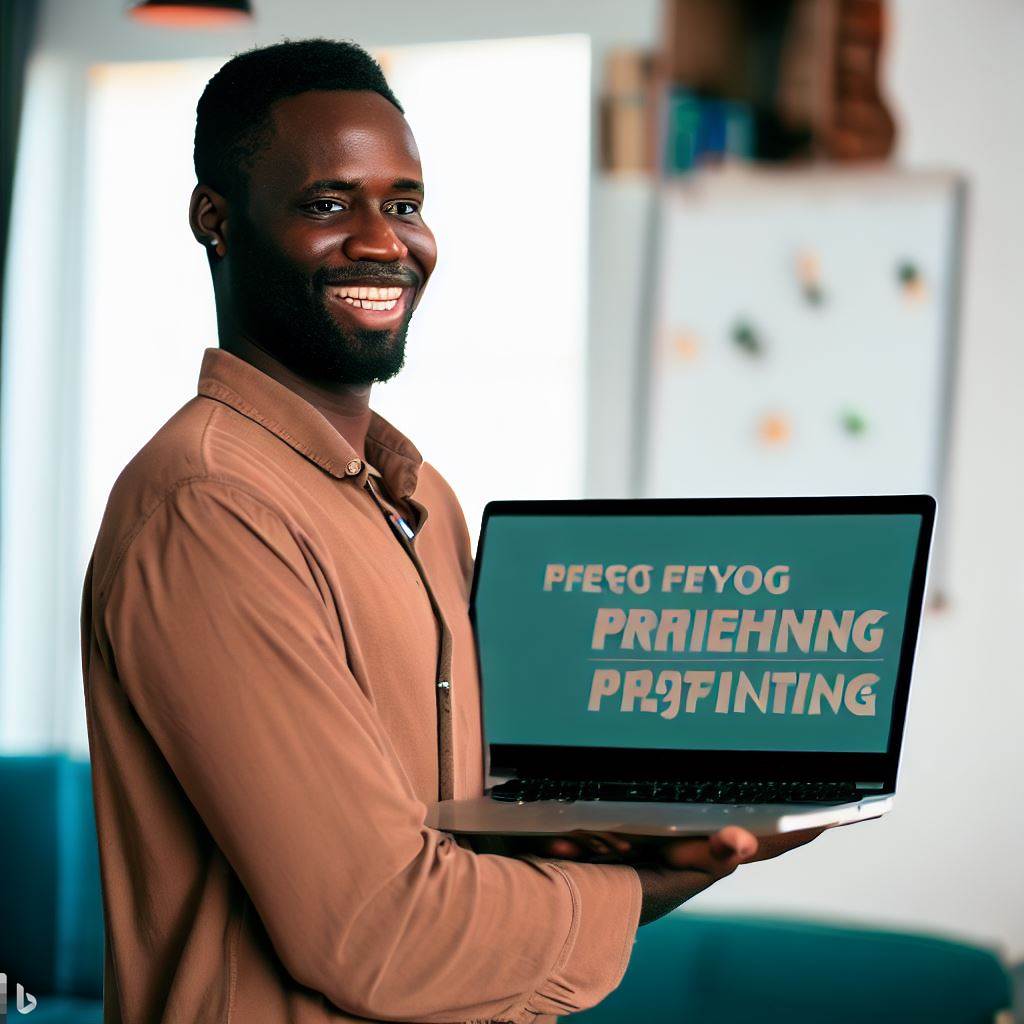Introduction
Freelancing has been on the rise in Nigeria, with over 15 million people working as freelancers. The industry is gradually growing and becoming a viable option for people seeking work opportunities.
As a freelancer, your skills and talent may not be enough to secure you the desired job. You also need to have good proposal writing techniques to convince clients to entrust you with their projects.
This blog post aims to help Nigerian freelancers understand the importance of proposal techniques and how they can use them to succeed in the industry.
We will explore some essential tips for writing a good proposal that can help you stand out from the crowd.
Understanding proposal techniques
Definition of Proposal
A proposal is a document that outlines a solution to a problem or an opportunity, typically in a business or academic setting.
The proposal is aimed at convincing the recipient to take a particular action or to make a decision in your favor.
Benefits of Using Proposal Techniques
Using proposal techniques can increase your chances of success.
A well-crafted proposal demonstrates that you understand the recipient’s needs, the problem or opportunity, and have a clear plan to address them. It also shows that you are organized, thorough, and have effective communication skills.
Types of Proposal Techniques
- Traditional proposals: These are comprehensive documents that typically include detailed information on the problem, solution, and implementation plan.
Traditional proposals can be time-consuming to create and may include supporting materials such as financial projections and case studies. - Short proposals: These proposals are concise and focused on the key points. There is less emphasis on comprehensive information and supporting materials, and more on the solution and benefits.
Short proposals are less time-consuming to create but require a clear understanding of the recipient’s needs and a compelling solution. - Conceptual proposals: Conceptual proposals are used when the problem or opportunity is not yet fully defined.
The proposal outlines a framework for addressing the issue and proposes a process for gathering additional information.
Conceptual proposals can be useful for initiating discussions and gaining buy-in from stakeholders.
In summary, understanding proposal techniques is crucial for success in the Nigerian freelance world.
By defining what a proposal is, highlighting the benefits of using proposal techniques, and identifying different types of proposal techniques, freelancers can create compelling proposals that stand out from the competition.
Whether using traditional proposals, short proposals, or conceptual proposals, freelancers should aim to demonstrate a clear understanding of the recipient’s needs and a persuasive solution.
Read: Effective Proposals: Winning Strategies for Nigerian Freelancers
Proposal Writing Tips for Nigerian Freelancers
Understand the Client’s Needs
Before writing your proposal, ensure that you have a clear understanding of what the client wants. You can achieve this by asking relevant questions or conducting an interview.
Research the Client’s Organization
Get to know the client’s organization, its mission, vision, and values. This information will give you an idea of how you can align your proposal with their objectives.
Use Simple and Concise Language
Avoid using complex words or industry jargon. Use simple, understandable language that the client can easily understand. Be concise, avoid fluff, and get straight to the point.
Use a Professional Tone
Use a professional tone in your proposal. Avoid being too casual or using slang. Use proper grammar, spelling, and punctuation. This gives the client confidence in your ability to deliver quality work.
Address the Client’s Concerns
Anticipate the client’s concerns and address them in your proposal. This will assure the client that you understand their needs and are capable of addressing them.
Emphasize your Skills and Experience
Highlight your skills and experience that are relevant to the project. This will show the client that you are the right person for the job and can deliver quality work.
Offer a Unique Value Proposition
Show the client what sets you apart from other freelancers. Offer a unique value proposition that will capture their attention and convince them to choose you for the project.
Provide a Clear Action Plan
Outline a clear action plan in your proposal. This will show the client that you have a well-thought-out approach to delivering the project and will give them confidence in your ability to execute it successfully.
Be Realistic with Your Pricing
Provide a pricing that is fair and reflective of the value you are offering. Be transparent with your pricing and explain how you arrived at the figure.
This will help the client understand the value of your work and make an informed decision.
By following these tips, Nigerian freelancers can write compelling proposals that stand out and win clients.
Read: Pitching Your Skills Right: The Nigerian Freelancer’s Toolkit

Common Mistakes to Avoid
While proposal writing is no rocket science, there are still common mistakes that Nigerian freelancers tend to make that jeopardize their chances of success when bidding on projects.
Here are some of the major ones:
Lack of Research
One of the biggest mistakes you can make as a freelancer is bidding on a project without doing proper research.
You need to understand what your potential client is looking for, their requirements, goals, and expectations.
Unclear Language
Another common pitfall is using vague or ambiguous language in your proposals.
Make sure that you express your ideas clearly and concisely, while avoiding slang or technical jargon which may not be understood by your potential client.
Too Much Fluff
Avoid the temptation to include too much fluff in your proposals – phrases that don’t add value or are irrelevant to the project can quickly turn off the client.
Remember to stick to the facts and focus on the value your services bring.
Not Addressing the Client’s Needs
Your proposal should not only highlight what you can offer, but also how your skills match the client’s needs. If you ignore the client’s needs, then your proposal will be easily overlooked.
Overemphasizing on Your Needs
You should focus on the benefits you bring to the client and avoid overemphasizing your own interests such as your hourly rate or need for payment upfront.
Strike a balance between selling your services and listening to your client’s preferences.
Engagement without Reciprocation
When responding to job listings, remember that the client also has a responsibility to engage with potential freelancers.
If they fail to respond, don’t waste your time and energy on them. Instead, focus on clients that actively respond to your proposals.
Lack of Professionalism
It is important to always present yourself in a professional and courteous manner. This means proofreading your work, using proper grammar and syntax, and dressing professionally when meeting clients in person.
Avoiding these common pitfalls will increase the chances of your proposal being accepted, and help you grow your freelance business with a more professional approach.
Read: Boost Your Freelance Business in Nigeria: Proposal Secrets
Proposal Submission and Follow-Up
As a freelancer, submitting proposals is a vital part of the job. You could be submitting proposals for a range of projects – from writing to website design.
It’s important to follow the correct procedure and timing to increase your chances of success.
Importance of Timing
- Check the deadline for proposal submission. Submitting late will not be considered.
- Submit your proposal early in the process to increase your chances of being noticed.
- Check the client’s time zone and work within their business hours to show professionalism.
Correct Submission Procedure
- Read the proposal guidelines and requirements carefully. Ensure that you have all the necessary documents and information.
- Include a cover letter that highlights your strengths and why you’re the best candidate for the job.
- Attach relevant samples of your work to showcase your skills.
- Ensure that your proposal is personalized and tailored to the individual project.
- Proofread your proposal several times to ensure that there are no errors or mistakes.
Follow-up After Submitting your Proposal
- Send a follow-up email to the client a few days after submitting your proposal.
- Thank the client for considering your proposal and reiterate your interest in the project.
- Ask if they need any further information or samples from you.
- Remind them that you’re available for any questions they have.
Listening to feedback
- Be open to feedback from the client. They may want to make adjustments or additions to your proposal.
- Take their feedback seriously and respond to it promptly.
- Revise your proposal as necessary to reflect the changes proposed by the client.
- Ensure that you have met all the requirements and guidelines before resubmitting.
Submitting proposals can be a stressful experience, but by following the correct procedures and timing, you can increase your chances of success.
Always ensure that your proposal is tailored to the individual project, personalized, and error-free.
Finally, be open to feedback and revise your proposal as necessary to show the client that you’re the best candidate for the job. Happy proposals!
Read: Creating Impactful Pitches: A Guide for Nigerian Freelancers
Conclusion
Successful freelancing in Nigeria hinges on three pivotal points.
First, develop a value-focused proposal. Second, personalize each application, making them specific to the client’s needs.
Lastly, establish strong communication and follow-ups to ensure transparency.
Embrace these techniques with courage and consistency. Fear not the initial challenges – they are stepping stones to mastery.
Remember, your success largely hinges on your ability to adapt and improve these strategies.
Ultimately, you hold the key to unlocking your potential in the Nigerian freelance world. Use it wisely.
So, dive in, imbibe these tactics, and watch as your freelance career transforms dramatically.
You’ve got this – go make your mark in the freelance world.




